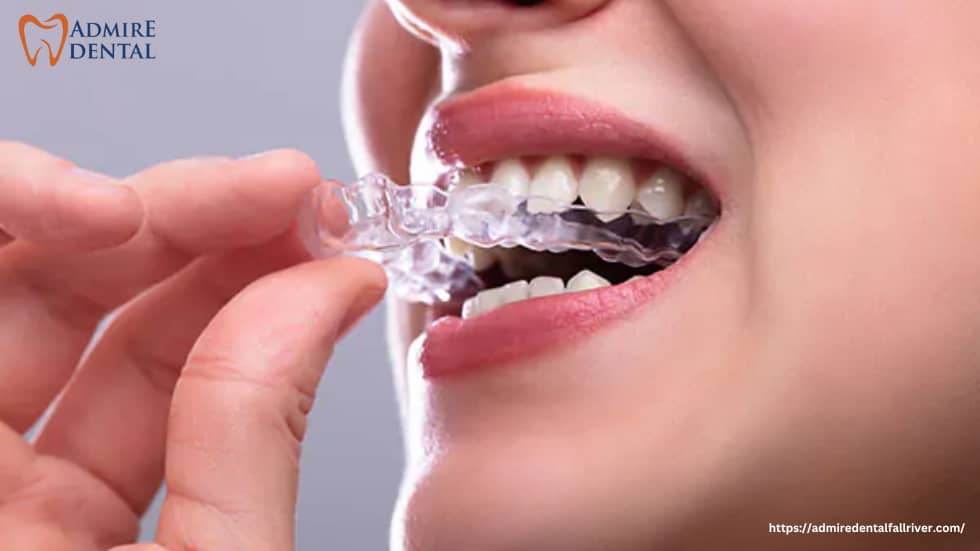About Teeth Grinding And Its Causes
Bruxism, or tooth grinding, can lead to several issues, including migraines, jaw pain, tense muscles, and shattered teeth. This problem is intended to be avoided using a mouth guard for teeth grinding, of which there are various varieties.
There are two forms of bruxism: nocturnal bruxism, which is the grinding of teeth while one is asleep, and diurnal bruxism, which occurs when a person grinds their teeth while they are awake. Wearing a mouthguard while sleeping helps people avoid crushing their teeth. Admire Dental Fall River provides personalized care and top-quality mouth guard for your teeth grinding solutions to help protect your smile.
A Mouthguard: What Is It?
Dental appliances that protect your teeth are called mouth guards. There are numerous sorts of them, and dentists recommend them for a variety of reasons. Mouth protectors are beneficial for both adults and children.
The majority of mouthguards cover your upper teeth. In certain cases, your dentist might also suggest a mouth guard for your lower teeth.
Are There Different Types Of Mouthguards?
Mouthguards come in three primary varieties. We can group them based on their intended use:
Sports Mouthguards:
These guard against sports-related dental damage. In sports like football, basketball, hockey, boxing, and wrestling, mouth protectors can significantly lower your chance of getting chipped and avulsed (knocked out) teeth.
For Teeth Grinding:
A mouth guard for your teeth grinding may assist in shielding your teeth from clenching and grinding. They might also lessen the consequences of TMJ issues. This kind of mouth guard is suitable for use day or night. However, wearing them at night is typical because most individuals clench or grind their teeth while they sleep. (These gadgets are sometimes referred to as night guards).
Mouthguards For Sleep Apnea And Snoring:
A customized mouth guard might be helpful for those who suffer from obstructive sleep apnea or persistent snoring. During sleep, this kind of appliance moves and realigns your jaw to clear your airway.
Furthermore, mouthguards can be created to order or purchased from a store:
Store-bought:
Mouthguards can be purchased in stores in two primary categories. Boil-and-bite (which you can slightly tweak at home) and stock (which you wear as-is, straight out of the box). While store-bought guards are less expensive, they aren’t as good at preventing sports-related injuries or teeth grinding as mouth guards created to order. Additionally, they shouldn’t be used to treat sleep apnea.
How Often Is It Appropriate To Wear A Mouthguard?
Depending on your requirement for a mouthguard, yes. You should wear one to all sessions and games if you require one to protect your teeth when playing contact sports. However, you’ll probably need to wear a mouth guard every night while you sleep if you require one to cure snoring, teeth grinding, or sleep apnea. If you’re not sure how often to wear your mouthguard, ask your dental health professional. or expert advice and personalized solutions, consult Admire Dental Fall River.
What Benefits Does Donning A Mouthguard Offer?
When participating in sports and other physical activities, wearing a mouth guard can assist you prevent:
- Broken Teeth
- Teeth Knocked Out
- Harm To The Pulp Of Your Teeth
- Soft-Tissue Damage To Your Inside Cheeks, Lips, And Gums
When you sleep, using a mouth guard can lower your chance of:
- Wear And Tear Brought On By Teeth Clenching And Grinding
- Snoring
- Headaches, Facial Pain, Jaw Pain, And Other Disease Symptoms
- Sleep Apnea And Its Associated Consequences, Such As Hypertension And Daytime Weariness
How to Select a Mouthguard?
Those selecting a mouthguard might want to take the following factors into account:
- Severity of Grinding:
When choosing a mouthguard, a person should consider their tooth grinding level. There are guards from some firms that can be used for different types of grinding.
- Durability:
When selecting a mouthguard, people should carefully study the manufacturer’s description. The average guard tenure is three months.
- Customization:
Wearing mouthguards that are made to order may be more comfortable for certain people. They are typically more expensive, though.
- Cost:
Custom mouthguards that last longer than single-size, throwaway ones are frequently more expensive. When buying a guard, a person might want to consider their budget.
When Should I Call My Doctor?
Ask your dentist for ideas on mouthguards if you participate in contact sports. Also, you want to get in touch with your medical professional if you have:
- Damage brought on by teeth grinding
- TMJ problem symptoms include facial pain, persistent headaches, and jaw pain.
- Signs and symptoms of obstructive sleep apnea, include headaches, irritability, and gasping for air as you sleep.
FAQs
How long does it take to get used to a mouthguard?
It could be challenging for some people to sleep when wearing a mouthguard. However, after using it for a few days, it usually gets more comfortable. People should stop wearing a guard if they feel pain or discomfort while using it.
Can someone with braces or dental implants wear a mouth guard?
Indeed. A mouth guard can shield braces, dental implants, and other dental restorations (like crowns and bridges) from harm in addition to shielding your teeth. The greatest mouthguards are custom-fitted. They conform to the specific form of implants or braces.
What is the lifespan of mouthguards?
With the right maintenance, a custom-made mouthguard can last several years, depending on how often you wear it. But other people might discover that they require mouthguard replacements more frequently than that. Make sure you bring your mouth guard to your dental appointment so your dentist can check it for wear indicators like cracks.
How long does it take to get used to a mouth guard for your teeth grinding?
It could be challenging for some people to sleep when wearing a mouth guard for teeth grinding. However, after a few nights of consistent use, most people find it becomes more comfortable. If you experience pain or discomfort, stop using it and schedule a consultation with Admire Dental Fall River for proper adjustment or recommendations.

